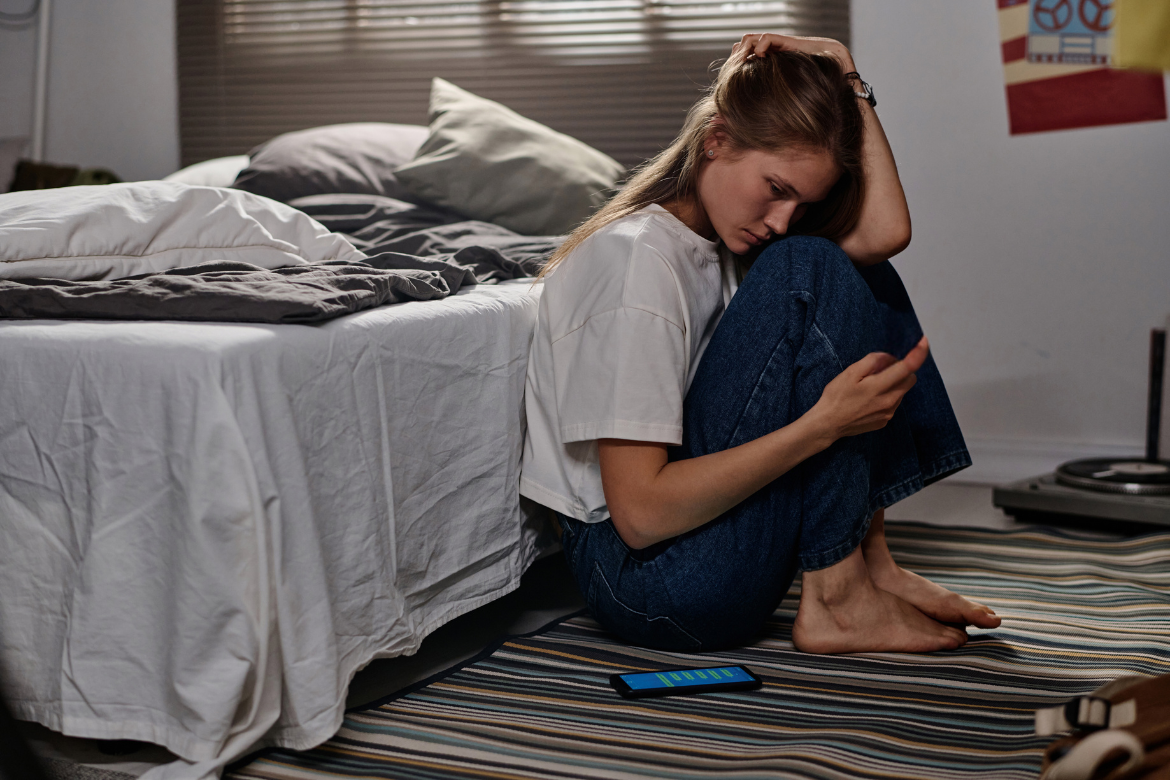

Bed Rotting: Self Care or Slippery Slope to Depression?
August 29, 2024 by Counseling and Wellness Center of Pittsburgh bed rotting, bed rotting trend, depression, depression counseling, Depression in Men, depression therapy, depressive episode, gen z, generation z, major depressive disorder, managing depression, self care, tik tok, what is bed rotting, worsening depression 0 comments
In the digital age, trends and terminologies often originate from social media, shaping how we view various aspects of life. One such trend that has gained traction among Gen Z is “bed rotting.” Popularized on platforms like TikTok, the bed rotting trend is embraced by many as a form of self-care and relaxation.
This blog answers, “What is bed rotting?”, its implications, and how it reflects a broader shift in attitudes towards productivity and self-care among younger generations.
What Is Bed Rotting?
Bed rotting refers to spending extended periods in bed, often involving activities like binge-watching shows, scrolling on your phone, reading, or just lounging.
For Gen Z, this term has been embraced as a form of self-care, a way to unwind and disconnect from daily pressures. Popularized on TikTok, bed rotting is celebrated as a guilt-free break from the constant hustle of modern life.
While it can be a valuable way to relax and recharge, excessive bed rotting may also signal underlying issues like depression or burnout. The term is commonly used on social media to describe taking time for rest and escape from everyday stress.
Gen Z and Self-Care
For Gen Z, bed rotting has become more than just a way to pass time; it’s seen as a legitimate form of self-care. This generation, which is increasingly aware of mental health issues, embraces the idea that taking intentional breaks is crucial for overall well-being.
Unlike older generations, who might have viewed extended periods of inactivity as unproductive or lazy, Gen Z sees bed rotting as a necessary pause from the demands and stresses of everyday life. This cultural shift reflects a broader acceptance of rest as a key component of mental health, rather than an impediment to productivity. By normalizing self-care practices, Gen Z is setting new standards for how we view and manage personal time and stress.

The Changing Landscape of Work-Life Balance
The concept of work-life balance has undergone a significant transformation, particularly with the rise of Gen Z in the workforce. This generation is redefining traditional notions of productivity by emphasizing the importance of mental and emotional well-being. Unlike previous generations, who often equated success with constant work and visible achievements, Gen Z values flexibility and personal time as essential to long-term success. They are vocal about setting boundaries and are challenging outdated expectations of relentless productivity.
This shift is reshaping workplace norms, leading to more adaptable work environments and a heightened focus on mental health initiatives. As a result, organizations are increasingly adopting policies that support work-life balance, reflecting the changing attitudes toward how work and personal life intersect.
When Bed Rotting May Signal a Deeper Issue
While bed rotting can be a healthy form of self-care, it is important to differentiate between intentional rest and signs of potential mental health issues. If bed rotting becomes a frequent pattern and is accompanied by other symptoms, it may indicate depression. To diagnose depression, symptoms must be present for at least two weeks and include at least five of the following, with at least one being:
- Depressed mood most of the day, nearly every day, as observed by others or self-reported.
- Markedly diminished interest or pleasure in all or most activities most of the day.
Additional symptoms that may be present include:
- Significant weight loss or gain, or changes in appetite.
- Insomnia or hypersomnia (excessive sleeping).
- Psychomotor agitation or retardation (restlessness or being slowed down).
- Fatigue or loss of energy.
- Feelings of worthlessness or excessive guilt.
- Difficulty concentrating or making decisions.
- Recurrent thoughts of death or suicide, or a suicide attempt.
Functional Impact: The symptoms cause significant distress or impairment in social, occupational, or other important areas of functioning.
If bed rotting is accompanied by these symptoms, it is essential to seek support from a mental health professional. Depression can significantly impact daily functioning and quality of life, and professional help can offer strategies to manage these challenges effectively.
Recognizing when self-care turns into a potential issue is crucial for maintaining overall well-being. Understanding the balance between healthy rest and signs of deeper mental health concerns can help individuals navigate their own needs and seek appropriate support when necessary.

If You Think Your Bed Rotting Could Be Depression, Reach Out
If you have several of the symptoms of depression and they have lasted longer than two weeks, please reach out for support. You can call us at 412-856-WELL or fill out the form below.
Reviewed by: Counseling and Wellness Center of Pittsburgh’s CEO & Founder, Stephanie Wijkstrom, LPC.
Related Posts
A Therapist’s Thoughts on Bipolar Disorder Inside and Outside the Therapy Room
March 14, 2022
As a therapist I have had many clients who were diagnosed with or in the process...
Single for Valentine’s Day? 12 Tips for How to Spend the Day
January 27, 2022
Valentine's Day can be a tricky holiday for us singles to navigate. It may bring...



